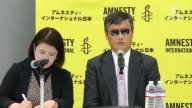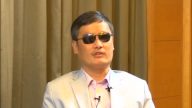【新唐人2012年5月4日讯】美国官员说,他们已经证实,中国盲人维权人士陈光诚希望和家人一起离开中国。美国国务院2号否认有关陈光诚出于胁迫、离开美国使馆的报导。陈光诚稍早之前离开美国使馆,前往北京一所医院接受治疗,当时他表示计划留在中国。但陈光诚3号对记者说,他的家人受到威胁,他不再相信北京会履行保护他们的承诺。他还对美方人员没有留在医院保护他们这点,表示担忧,他现在希望前往美国得到政治庇护。
美国国务院发言人纽兰5月3号说,美国官员正在与陈光诚讨论各种选择方案,他目前在北京一家医院,受到中共当局的监视。
陈光诚于5月2号离开了美国大使馆到朝阳医院就医,根据与中共当局达成的协议,当局将保证他的安全。
但美国“对华援助协会”主席傅希秋指出,陈光诚是带着非常沉重的、受威胁的心情离开美国使馆的。
傅希秋:“中方通过美方传递给陈光诚的资讯就说,如果你不在今天离开美国大使馆,那么你的家人就要被返回,返回到临沂的家乡,你就没有机会再跟你的家人团聚了。他的家人变成了人质。”
很多中国民主和人权活动人士也认为,奥巴马政府让陈光诚离开大使馆,是极不负责任的行动。
而此前援助陈光诚出逃的美国“对华援助协会”明确表示,陈光诚并不希望离开中国,他希望继续留在中国,完成他的工作。
陈光诚为何改变了主意?北京维权律师滕彪在网上公布了他2号与陈光诚几次通话的全部内容。从中可以看出,陈光诚对中共当局保证他们一家正常生活的承诺产出怀疑。滕彪也在电话中提醒陈光诚警惕当局的秋后算账。
3号,陈光诚对美国有线电视新闻网CNN记者说:使馆不停的游说我离开,并承诺会有人与我留在医院。但下午,到医院办理手续,发现他们都不见了。
美国“对华援助协会”负责人傅希秋:“这就需要中美又要再进行新的一轮的谈判,中方肯定是现在把他看管的非常严,不会再故意让他离开安全人员的视线了。”
但傅希秋指出,美国很多人都在关心陈光诚和他的家人,希望他们平安的来到美国。
傅希秋:“美国很多的议员都给我打电话,我们这两天,每天的电话声不断的,几乎几千个电话。媒体还有很多都在表达支持,电子邮件无数。我相信大家都被他事迹很感动。美国在政府上处理这个事件肯定是犯了很大的错误,有些某方面的考虑。我们还是希望尽快再推动美方,再次跟中国谈判。”
美国国务院副发言人马克•托纳(Mark Toner) 2号表示,美国会继续关注陈光诚的状况。美国国会在美国时间3号,就陈光诚事件最新的发展,举行紧急听证会。
不过,中共外交部发言人表示:“美国驻华使馆以非正常的方式将中国公民陈光诚带入使馆,是对中国内政的干涉,中方决不接受。中方要求美方就此道歉,并保证不再发生此类事件。”
对此,美国国务院说,美国的决定不但合法,也符合美国的价值观。
3号,美国国务卿克林顿在战略安全对话发言时,敦促中国保护人权,但她没有提到陈光诚。
(采访/陈汉 编辑/宋风 后制/孙宁)
***********************
US Officials: Chen Guangcheng Wants to Leave China
US officials said they confirmed that China’s blind activist Chen Guangcheng hopes to leave China with his family. On May 2, US State Department denied the reports that Chen was threatened to leave the US Embassy. Earlier, Chen guangcheng had left the Embassy to seek medical treatment in Beijing hospital.
At that time, Chen said he wanted to stay in China.
However, Chen changed his mind on May 3, telling the journalists that his family was threatened. And he does not believe that Beijing’s regime could keep
their promise to ensure the safety of his family and himself. Chen also voiced his worries that none of the US officials stayed in the hospital for his protection. Now he wants to flee to the US for a political asylum.
On May 3, US State Department Spokeswoman Victoria Nuland said US officials are discussing various options with Chen Guangcheng. Chen is currently hospitalized in Beijing under surveillance of the Chinese Communist Party (CCP).
On May 2, Chen Guangcheng left the US Embassy to seek medical treatment in Beijing Chaoyang hospital. According to the agreement with the CCP authorities,
the regime will ensure Chen’s personal safety.
However, Bob Fu, president of China Aid Association, points out that Chen left the US Embassy with a heavy heart, feeling coerced.
Bob Fu: “The Chinese side told Chen Guancheng, through the US official, ‘If you don’t leave the US Embassy, your family will be sent back to your home in Linyin.’ ‘You won’t have any chance to reunite with them anymore.’ That is, his family actually has become a hostage.”
A lot of Chinese pro-democracy and human rights activists thought it was extremely irresponsible of the Obama Administration to have let Chen leave the Embassy.
Earlier, US-based China Aid Association that had assisted Chen’s escape, said Chen does not want to leave China. Chen wanted to stay in China to complete his work.
Why did Chen Guangcheng change his mind later on? Beijing-based human rights lawyer Teng Biao released transcripts of several phone calls made between him and Chen on May 2. The conversations show that Chen began to doubt CCP’s promise to ensure his family will live a normal life. Over the phone, Teng Biao warned Chen Guangcheng about CCP’s retaliation.
On May 3, Chen Guangcheng told CNN journalist, “The Embassy kept lobbying me to leave and promised to have people stay with me in the hospital.” “But this afternoon as soon as I checked into the hospital room, I noticed they were all gone.”
Bob Fu: “This requires a new round of Sino-US negotiation. Now he is surely under very tight control of the Chinese. They won’t let him out of the security guards’ sight again.”
Bob Fu notes that many Americans are concerned about Chen and his family, and hope they will come to the US.
Bob Fu: “Many US MPs called me. Over the last few days, I received about several thousand phone calls. Besides the media, enormous emails were sent to us
to express their support for Chen. I believe that everyone was touched by his deeds.
The US government has certainly made a big mistake in handling Chen’s case. They had some thoughts of certain aspects. But we still hope for pushing the US side to hold another negotiation with China as soon as possible."
US State Department deputy spokesman Mark Toner stated on May 2, US will continue monitoring Chen’s situation. On May 3, the US Congress held an emergency hearing on the latest development of Chen Guangcheng’ case.
However, the CCP Foreign Ministry Spokesman said: “The US Embassy in China took Chen Guangcheng, a Chinese citizen, into the Embassy via abnormal means.” “The US move is an interference in China’s internal affairs, which is completely unacceptable for China.” “China demands the US apologize for that, … and promise not to let similar incidents happen again.”
The US State Department responded that the US decision was not only legitimate, but also in line with US values.
On May 3, US Secretary of State Hilary Clinton pressed China on human rights in her opening remarks to the US-China Strategic and Economic Dialogue in Beijing.
Yet Clinton did not mention Chen Guangcheng.






















